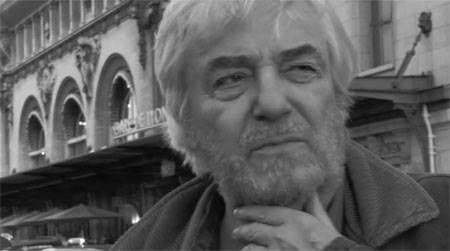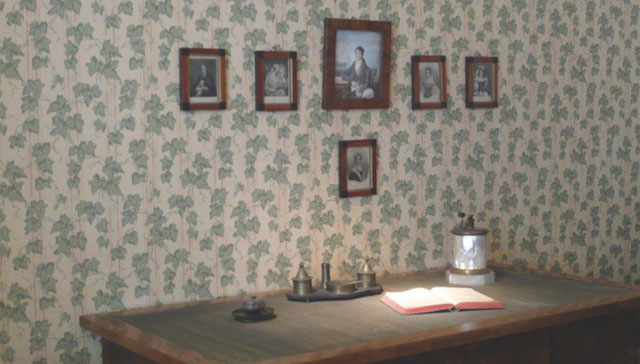We rarely begin with the “in the works” mini-bulletins, but today brings an exceptional batch of news. First off, Andrzej Żuławski has been pitchingDark Matter for a few months now, and Quiet Earth has a synopsis of this “scifi/metaphysical/noir” and the first bit of artwork. Żuławski is evidently still rounding up financing and, hopefully, with interest in his work revived by the retrospective that bopped around the U.S. earlier this year, he’ll have it all sewn up sooner rather than later.
In a bit of related viewing (11’44”), journalist Jean-Jacques Bernard discusses the project with Zulawski—in French.
“Neue Welle” is the title of a roundup from director and Revolver co-editor Christoph Hochhäusler. Just the other day, we passed along word that he’ll begin shooting his Berlin-set thriller next year and, on Friday, he posted a first snapshot from the set of Dominik Graf’s Die Geliebten Schwestern (The Beloved Sisters; all the English titles that follow, by the way, are my own off-the-cuff translations and may well not be the ultimate official versions). The sisters are Caroline and Charlotte, played by Hannah Herzsprung und Henriette Confurius, who, in 1788, both fall in love with Friedrich Schiller (Florian Stetter).
This weekend, Christoph’s checked in on a slew of promising projects in various stages of production by German and Austrian directors. I’m going to go with alphabetizing them by name:
Thomas Arslan (In the Shadows) is in Canada shooting Gold, in which a group of German immigrants leave New York in 1897 to head up to the great northwestern territory of Yukon in search of, that’s right, gold.
Valeska Grisebach’s Western looks to be an intense study of a duel between two men. Maren Ade is one of three producers (along with Grisebach and Janine Jackowski).
Jessica Hausner (Lourdes) is setting up Amour Fou, inspired by the lives and love of Heinrich von Kleist and Henriette Vogel, whose 1811 suicide pact is the stuff of big-R Romantic legend (he was 34 and she was 31). Coop99, I should mention, also lists three more films in production definitely worth noting: Barbara Albert’s Die Lebenden (The Living), in which a 25-year-old student probes her family’s dark past; Antonin Svoboda’s The Strange Case of Wilhelm Reich (pretty self-explanatory); and Götz Spielmann‘s Oktober November, about two sisters and their dying father.
Benjamin Heisenberg (The Robber) is shooting his first comedy, Wandelsterne (Wandering Stars), a “buddy movie” centering on a bohemian and a famous psychologist with a Nazi past. With Georg Friedrich and Andre Wilms.
Pia Marais (At Ellen’s Age) is in post-production on Layla Fourie, about “a young single-mother in South Africa [who] receives a job assignment as polygraphist. In the constant presence of mistrust, lies and fear, Layla soon becomes a suspect herself.” With Rayna Campbell and August Diehl.
Franz Müller (Die Liebe der Kinder) is working on the no-budget film he shot in Poland over the summer.
Christian Petzold (Yella, Jerichow) has received a first round of funding for Phoenix: A woman long believed to have died at Auschwitz undergoes plastic surgery, meets her husband again, but keeps her identity a secret.
Maria Speth (Madonnas) is editing Anonym, about a teacher looking for her daughter in Berlin.
Isabelle Stever’s in pre-production for Hotel Lounge: A German aid worker who falls for a much younger Lebanese man.
Nicolas Wackerbarth is about to wrap up Halbschatten (Half Shadows), in which a 37-year-old woman accepts an invitation from her lover to spend a summer in the south of France; when she arrives, she finds only his children.
Noting that 2013 and 2014 look very promising indeed, Christoph also mentions that Maren Ade, Romuald Karmakar, Ulrich Köhler, Angela Schanelec, and Henner Winckler are also at work on new projects.
DVD/Blu-ray. For Screen Comment, Ali Naderzad has translated Jean-Michel Frodon‘s review of a new boxed set of films restored by Martin Scorsese’s World Cinema Foundation, now out from Carlotta Films. The set collects four films “very different from each other” though “what they do hold in common is their overwhelming distinctiveness”: Ermek Shinarbaev’s Revenge (1991), “a Russian-language Kazakhi movie whose characters are Korean,” Ahmed El Maanouni’s Trances (1981), Fred Zinnemann and Emilio Muriel Gomez’s Redes (1936), actually photographer Paul Strand’s project, Frodon argues, and Djibril Diop Mambéty‘s Touki Bouki (1973), “an extraordinarily inventive and original film, for which one would be hard put to find an equivalent anywhere in the world, including in Africa.”
Dave Kehr reviews a selection of new releases including George Sidney’s Bye Bye Birdie (1963), in which Ann-Margret’s rendition of the title tune “stops the show before it has even begun. Wearing a canary-yellow dress before a simple, deep-blue backdrop, she locks her eyes with the camera lens and, in one continuous take, delivers a performance so charged with erotic energy that you can practically feel a nation’s toes curling.”
Also in the New York Times, Marc Spitz talks with director Franc Roddam about Quadrophenia (1979), out now from Criterion.
Reading. Light Industry‘s posted Artforum‘s special 1971 issue on film, edited by Annette Michelson and including pieces by Hollis Frampton and Michael Snow.
“Directors are required to be showmen, particularly directors of documentaries, who always have to hustle to finance and screen their work,” writes Hari Kunzru for Hazlitt. “But [Werner] Herzog’s presence, his insistence on being in the middle of things, is something more like an artistic strategy—which is to say it’s the very opposite of a strategy, unless it’s possible to be both strategic and uncalculated, canny and impulsive at the same time.”
David Liu presents “a transcription of a Q&A session held at UC Berkeley’s Pacific Film Archive in November 2010, in which American director Kelly Reichardt discussed her career and creative process.”
Just up at the Chiseler: John Strausbaugh on Eddie Cantor, Imogen Smith on Route 66, a TV show that “ran from 1960 to 1964 on the slender premise of two young men driving aimlessly around America,” and Jim Knipfel on The Untouchables, a show “narrated by legendary staccato newsman Walter Winchell” and featuring an “endless parade of great character actors.”
Further browsing. This week’s “Underground Film Links” from Mike Everleth.
For news and tips throughout the day every day, follow @KeyframeDaily on Twitter and/or the RSS feed. Get Keyframe Daily in your inbox by signing in at fandor.com/daily.





